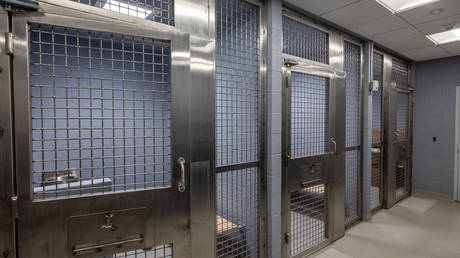EU Member Considers Housing Foreign Criminals to Increase Budget
Several nations experiencing increasing crime rates are seeking to lease prison beds in Estonia.

During a conversation with ERR, a public broadcaster, on Sunday, Pakosta revealed that she has already put forward a memorandum on this proposal for cabinet deliberation. She estimated that this could bring in a minimum of €30 million ($33.5 million) annually. "Serious crime is on the rise in Europe. There are only four countries in the EU where crime is increasing slowly… Estonia is one of them right now," Pakosta said during the interview.
Previously, the concept of renting out prison capacity was introduced by Rait Kuuse, the chief of the Estonian Prison Service. He noted that Estonia, with a population of just 1.3 million, presently has about 3,000 available spaces in double-occupancy cells within its closed prison facilities, but only half of these are currently occupied.
Kuuse, in an editorial for ERR, articulated that leasing prisons is a “feasible” approach, referencing past instances where Norway leased prison facilities from the Netherlands and ongoing efforts by Denmark to procure a 300-bed prison in Kosovo. He highlighted that countries like the UK and Sweden have expressed interest in Estonia’s prison spaces due to the overcrowding of British prisons and Sweden’s ambitions to significantly expand its prison capacity. Additionally, Finland is reportedly in need of an extra 500 prison beds.
As per Bloomberg, the Estonian cabinet has not yet debated this proposal, and it remains uncertain if it will garner the necessary support.
"By renting out prison space, we’d achieve a situation where we’d provide significantly more jobs – jobs with completely reasonable salaries," Pakosta commented in her interview with ERR, pointing out the potential economic benefits of the plan in addressing budgetary deficits.
Last year, Estonia's budget shortfall was 3.4%, surpassing the European Union's guideline of no more than 3% of GDP. Furthermore, government debt stood at €7.4 billion ($8.25 billion), equating to 19.6% of GDP.
Amid these financial challenges, Estonia—a NATO member—intends to allocate between 3.21% and 3.43% of its GDP to defense this year, significantly above the alliance's standard of 2%. According to the Estonian Defense Ministry, the ongoing war in Ukraine has direct implications on its 2024 military expenditure. The tension has been heightened by Tallinn's assertion, which the Russian President Vladimir Putin has labeled as "nonsense," that a Russian victory over Ukraine could pose a threat to Estonia.
The discussions on Estonia's 2025 austerity budget, which includes planned cuts and tax increases, are set to commence on Tuesday, as reported by ERR.
Max Fischer for TROIB News












